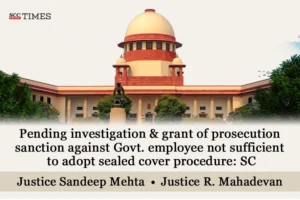Supreme Court: While deliberating over the instant appeal challenging Delhi High Court’s decision to uphold Central Administrative Tribunal’s (CAT) decision to allow respondent’s application challenging the denial of promotional benefits to him, the Division Bench of Sandeep Mehta* and R. Mahadevan, JJ., held that the disciplinary/criminal proceedings can be said to be initiated against a government employee only when a charge memo is issued to the employee in a disciplinary proceeding or a charge-sheet for a criminal prosecution is filed in the competent Court. The sealed cover procedure is to be resorted to only after issuance of the charge-memo/charge-sheet is issued. The pendency of investigation and grant of prosecution sanction will not be sufficient to enable the authorities to adopt the sealed cover procedure.
Background:
The respondent was appointed as Assistant Commissioner of Income Tax on 16-12-1987. He was granted due promotions to the post of Deputy Commissioner of Income Tax, Joint Commissioner of Income Tax, and Additional Commissioner of Income Tax in December 1991, July 2001, and November 2001, respectively. On 31-12-2001, an FIR was registered against the respondent for the offences punishable under Section 120-B of the Penal Code, 1860, and Sections 13(1) and 13(1)(d) of the Prevention of Corruption Act, 1988, alleging inter alia that the respondent, while working as the Special Secretary (Finance), Government of Arunachal Pradesh acted in conspiracy with other officers and committed criminal misconduct by abusing his position as a public servant. Subsequently, a sanction in June 2006, was accorded by the CBDT (Department of Revenue, Ministry of Finance, Government of India) for the prosecution of the respondent.
In February 2007, the Departmental Promotion Committee (DPC) was convened to consider the promotion of Additional Commissioner of Income Tax to the post of Commissioner of Income Tax. Since the respondent had attained eligibility for promotion to the post of Commissioner of Income Tax, his case was also considered. However, the vigilance certificate of the respondent was withheld; and the recommendations of the DPC regarding the promotion were kept in a sealed cover on the ground that the ‘Prosecution for criminal charge’ was pending against the respondent, and thus, he was deprived from being considered for promotion along with his batchmates.
Being aggrieved by the withholding of the vigilance clearance and adoption of the sealed cover procedure, the respondent approached CAT and the appellants were directed to consider the case of the respondent and pass a reasoned order within two months.
In compliance with the afore-stated direction, the appellants considered the respondent’s case for promotion and rejected the same via order dated 15-1-2011, holding that there was no justification for the opening of ‘Sealed Cover’ and considering the case of the respondent herein for promotion along with his batchmates. This order was challenged by the responded before CAT, Principal Bench and in the order dt. 7-3-2012, the Tribunal directed the appellants herein to open the sealed cover adopted in the case of promotion of the respondent and give effect to the same, and if he was found fit for promotion, then to promote him and award back wages with costs quantified at Rs. 10,000.
The appellant challenged the afore-stated CAT order before Delhi High Court, which was rejected. The Supreme Court granted leave in November 2013 and via order dt. 13-6-2024, directed the appellants to produce the ‘Sealed Cover’ containing the recommendation of DPC in relation to the respondent and the same was submitted by the counsel for the perusal of the Court.
Contentions:
The appellant drew Court’s attention towards Office Memorandum (OM) dated 14-9-1992 dealing with ‘Promotion of Government servants against whom disciplinary/court proceedings are pending or whose conduct is under investigation-Procedure and guidelines to be followed’ and contended that Para No. 2(iii) i.e. ‘Government servants in respect of whom prosecution for a criminal charge is pending’, must be read considering the object sought to be achieved i.e. a tainted officer should not be allowed to be promoted till the cloud is clear and during this period, the sealed cover procedure is to be adopted.
The appellant further contended that OM does not specifically indicate as to before which forum or at what stage, the prosecution for criminal charge is required to be pending to attract the sealed cover procedure and thus, this expression should be interpreted in a wider sense to even cover a case in which investigation for a criminal charge is pending with the Investigating Agency.
Per contra, the respondent argued that that the denial of promotion to the respondent by resorting to ‘the sealed cover procedure’ is ex-facie illegal and bad in eyes of law. It was argued that the respondent was not placed under suspension; no departmental proceedings were ever initiated against the respondent and no criminal charge was pending against him and thus the restrictive clauses would not ex-facie operate against the respondent’s right to be considered for promotion.
The respondent urged that the Central Government, while framing the 1992 OM specifically and consciously deleted the requirement of a sealed cover procedure in respect of Government servants against whom the sanction for prosecution is granted as was mentioned in the second part of Para 2(iii) of the 1988 OM. He contended that by mere grant of sanction, the prosecution for a criminal charge could not be said to be pending against a government servant.
Court’s Assessment:
Perusing the facts and contentions raised by the parties, the Court had to consider whether mere grant of prosecution sanction, it could be said that the prosecution for a criminal charge is pending against the respondent; and whether grant of sanction for prosecution could be a valid ground for putting the DPC recommendations in a sealed cover?
Taking note of the 1992 OM, the Court stated that it prescribes the conditions under which the assessment done by the DPC is to be kept in the sealed cover. According to this OM, the sealed cover procedure can be resorted to in respect of three categories of Government servants-
(i) Government servants under suspension,
(ii) Government servants in respect of whom a charge sheet has been issued and the disciplinary proceedings are pending, and
(iii) Government servants in respect of whom prosecution for criminal charge is pending.
Since the appellant contended that the respondent’s case falls under scenario (iii) the question requiring consideration was whether a mere grant of prosecution sanction would be sufficient to infer that the prosecution for a criminal charge was pending against the respondent.
The Court took note of Union of India v. K.V. Jankiraman, (1991) 4 SCC 109, where similar issue came up and the Court observed that the sealed cover procedure is to be resorted to only after the charge-memo/charge-sheet is issued. The pendency of preliminary investigation prior to that stage will not be sufficient to enable the authorities to adopt the sealed cover procedure.
The Court took note of the fact that in OM dt. 2-11-2012 the Ministry of Personnel, Government of India issued certain clarifications regarding the stage when a prosecution for criminal charge can be said to be pending, keeping in view the dicta laid down in K.V. Jankiraman (supra).
Given the afore-stated legal position, the Court then examined whether the prosecution for criminal charge was pending against the respondent when the DPC meeting was held. Pointing out the timeline, the Court noted that sanction to prosecute the respondent was granted in June 2006 and the charge sheet was filed by CBI, after completion of investigation in October 2008, whereas the DPC to consider the promotion of Additional Commissioners of Income Tax was convened in February 2007, wherein the sealed cover procedure was adopted qua the respondent.
Hence, the Court found that the charge sheet against the respondent was filed well after the meeting of the DPC was convened. Hence, it could not be said that the prosecution for a criminal charge was pending against the respondent when the DPC was convened. Therefore, the move on the part of DPC to resort to the sealed cover procedure was unjustified and unsustainable on facts and in law. Furthermore, when the sealed cover on the respondent’s assessment by the DPC was opened, he was found to be ‘fit’ for promotion.
Hence the Court deemed it fit to not interfere with the CAT and Delhi High Court’s decision and dismissed the instant appeal.
CASE DETAILS
|
Citation: Appellants : Respondents : |
Advocates who appeared in this case For Petitioner(s): For Respondent(s): |
CORAM :


